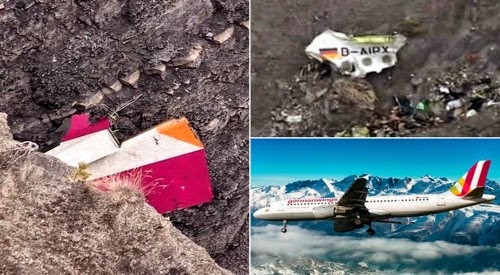The co-pilot of Germanwings Flight 9525 appears to have deliberately crashed the plane after he was left alone in the cockpit, according to a French prosecutor. The captain was intentionally locked outside minutes before the A320 crashed into an alpine mountain ridge, French Prosecutor Brice Robin said Thursday.
Co-pilot Andreas Lubitz, a 28-year-old German national, was silent throughout the plane’s descent and was alive at the point of impact, according to the prosecutor. Mr. Robin’s conclusions are drawn from the plane’s cockpit voice recorder, recovered at the crash site in the French Alps late Tuesday and analyzed by French accident investigators on Wednesday. The recording contains screams believed to be from passengers, once they recognized the plane was crashing.
Investigators are now exploring why Flight 9525 went into its unauthorized descent from its 38,000-foot cruising altitude with one crew member absent. The descent led to the crash about 10 minutes later. French air accident investigators said on Wednesday they extracted information from the jet’s cockpit voice recorder. The recording contained voices and other sounds, said Rémi Jouty, director of France’s aviation accident investigation office, which is leading the probe.
He added that there was no explanation yet for why the plane went down. Germanwings, the low-fare unit of Deutsche Lufthansa AG, hasn’t disclosed the identity of the pilots. Personal details such as names and ages were being withheld “out of respect for the next of kin,” an airline representative said. But a flight club identified Mr. Lubitz as a member and the co-pilot of the plane.
“Andreas became a member of the club as a youth to fulfill his dream of flying,” the LSC club said in a death notice on its website. “He fulfilled his dream, the dream he now paid for so dearly with his life,” the club said. A member of the flight club identified him to The Wall Street Journal on Thursday. Both the pilot and co-pilot were trained by the airline. The senior pilot has been with Germanwings since 2014 after flying for Lufthansa and Condor, another German airline.
He has flown more than 6,000 hours, mostly on Airbus jets. The co-pilot joined Germanwings in 2013 and had logged 630 flight hours. The revelation came as the search-and-recovery operation resumed in the French Alps for the second straight day since the flight from Barcelona to Düsseldorf slammed into the mountain face. Helicopter flights resumed Thursday from the alpine village of Seyne near the crash site, taking mountain rangers, forensic teams and other staff to recover bodies and body parts, said Col. Jean-Marc Menichini, the region’s police chief. “The priority is now to evacuate the bodies,” he said.
Forensic teams mapped out and photographed the crash site, tagged fragments and body parts and began removing the first human remains on Wednesday afternoon. Weather conditions have improved, making the search-and-recovery mission easier. The location of the crash, on a steep slope, still makes the work dangerous for the forensic staff and investigators, who were working with ropes and crampon shoes.
The local chief of high-mountain rangers, Yves Naffrechoux, said officials spent the night on site to secure the area. Police officers are guarding all access to the site from lower in the hills to keep trespassers and journalists away, Mr. Menichini said. Protected cockpit doors have become largely standard in the aviation industry after the Sept. 11, 2001 terrorist attacks in the U.S., when hijackers penetrated the cockpit and crashed the jets, causing the most fatalities ever in an aviation-related event.
Regulators in most markets quickly moved to protect cockpits with secure doors. Airbus won regulatory approval for its high-security door design in 2002. The door comes with an electronic entry pad that can be opened with a special access code from the outside, but the request can be denied from inside the cockpit by pressing a button within a few seconds after the request. That is a security measure to prevent a person with knowledge of the access code to be forced or coerced into opening the cockpit door from the outside.
When crew members try to access the cockpit from the outside a buzzer is triggered. Air accident investigators should be able to hear that sound on the cockpit recording. Airlines in Europe have discretion over how they deal with one of the pilots leaving the cockpit. Lufthansa on Wednesday said that in certain phases of a flight, one of the pilots may leave the cockpit temporarily and that it is normal for the remaining pilot to be alone in the cockpit.
The BEA, France’s flight safety agency, had no immediate comment on the development. Lufthansa, the parent company of Germanwings, declined to comment on the actions of the pilots. The crash took a heavy toll on Germany and Spain, which had the most nationals on board. Family members of the victims being brought to the crash site on Thursday, Lufthansa Chief Executive Carsten Spohr said.
Spain’s government said it now believes that 50 Spaniards died, down from an earlier estimate of 51, and the number could still change. Spain’s deputy Interior Minister Francisco Martínez said one of the victims, who had initially been identified by family members as Spanish, was no longer a citizen. Family members of most of the Spanish victims had been flown to Marseille, France, and were being transported by road to the vicinity of the site.
They are being accompanied by psychologists and government representatives, said José Luis Ayllón, a senior government official. The Joseph-König school in Haltern am See released the names of the 16 students it lost on the flight in a condolence statement on its website. “The news about the terrible airplane crash in France appalled us all,” the school said, adding the school is “stunned and unspeakably sad” about the loss of the 16 pupils and two teachers.

No comments:
Post a Comment